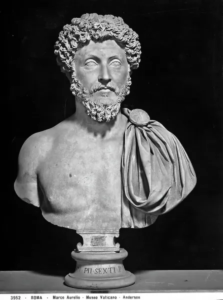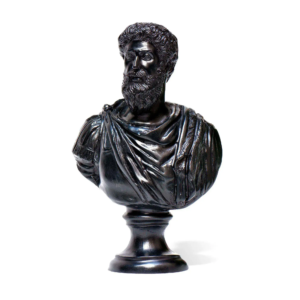The Stoic Teachings of Marcus Aurelius: Wisdom for Daily Life
Marcus Aurelius: Stoic Emperor

The Roman Empire had many leaders, but Marcus Aurelius stands out. He was a philosopher-king who lived by Stoic principles.
Marcus Aurelius, a Stoic Emperor, ruled the Roman Empire with wisdom. He left behind a wealth of philosophical thoughts in his writings.
His time in power is a great lesson in leadership and philosophy. It shows us how to face life’s challenges.
Key Takeaways
- The significance of Marcus Aurelius as a philosopher-king in Roman history.
- An overview of his Stoic philosophy and its application in leadership.
- The enduring legacy of his writings and their relevance to modern readers.
- The challenges faced by Marcus Aurelius as a ruler of the Roman Empire.
- The intersection of philosophy and governance in his reign.
The Early Years of Marcus Aurelius
Marcus Aurelius was born on April 26, 121 AD. He came from a noble Roman family. His upbringing was a mix of luxury and hard study, common for the aristocracy.
Family Background and Birth
His father, Marcus Annius Verus, was rich and influential. His mother’s family, the Calvisii, was also well-respected. This made Marcus‘s start in life very promising.
Childhood in Roman Aristocracy
Marcus grew up with the power and duties of nobility around him. He was taught both books and fighting, preparing him for leadership.
His childhood taught him about duty, honor, and learning. These lessons shaped his later love for Stoicism.
Education and Philosophical Foundations
Marcus Aurelius‘s education was key in shaping his thoughts and leadership. He learned from many tutors, each influencing his views and actions.
Tutors and Early Influences
Marcus Aurelius had several important tutors. Marcus Cornelius Fronto, a famous orator and lawyer, taught him about rhetoric and hard work. Fronto’s lessons on diligence and integrity deeply affected Marcus Aurelius.
First Encounters with Stoicism
Junius Rusticus introduced Marcus Aurelius to Stoicism through Epictetus’s works. This exposure deeply influenced Marcus Aurelius, shaping his Stoic beliefs and leadership approach.
Other Philosophical Influences
Marcus Aurelius was also exposed to other philosophies. His education was diverse, covering many perspectives. This broadened his understanding of the world.
Path to Imperial Power

Marcus Aurelius‘s adoption by Antoninus Pius in 138 AD was a key moment. It started his journey to become emperor.
Adoption by Antoninus Pius
Antoninus Pius, chosen by Emperor Hadrian, adopted Marcus Aurelius and his brother Lucius Verus. This move was strategic. It ensured Marcus Aurelius‘s future role.
Preparation for Leadership
Under Antoninus Pius, Marcus Aurelius learned politics, philosophy, and military affairs. He was prepared for leadership, taking on roles in the Roman administration.
Political Apprenticeship
Marcus Aurelius‘s time under Antoninus Pius was very valuable. He learned by attending senate meetings and making important decisions. This training helped him face the challenges of being emperor.
Ascension and Early Reign
The year 161 AD was a turning point for Marcus Aurelius as he took the throne with Lucius Verus. This started a new chapter for the Roman Empire, with Marcus Aurelius leading the way.
Taking the Throne
Marcus Aurelius became emperor after Antoninus Pius adopted him. This was a common practice in Rome to ensure a smooth transition. It showed the empire’s commitment to stability and continuity.
Co-rule with Lucius Verus
Marcus Aurelius chose to rule alongside Lucius Verus, whom he also adopted. This was a bold move, aiming to strengthen the empire’s leadership. Yet, it brought its own set of challenges due to their different personalities and governance styles.
Initial Challenges
Marcus Aurelius faced many challenges early in his reign. The empire was threatened by neighboring tribes and needed to stay prosperous and stable internally.
| Challenge | Description | Outcome |
|---|---|---|
| External Pressures | Threats from neighboring tribes | Successful defense and strategic alliances |
| Internal Issues | Administrative and economic challenges | Reforms and adjustments to governance |
Marcus Aurelius tackled these challenges with his usual stoic strength. His early years as emperor showed his ability to balance leadership with his deep commitment to Stoic philosophy.
Governance and Administrative Reforms
Marcus Aurelius brought many reforms to his rule, showing his Stoic values. He aimed for justice, fairness, and the happiness of his people.
Legal and Social Policies
He made laws simpler and fair for everyone. He also helped the poor and supported education.
Economic Management
He worked hard to keep the economy stable. He invested in projects to grow the economy.
Approach to Governance
His Stoic beliefs shaped how he ruled. He sought to be just and wise in his decisions.
| Reform Area | Description | Impact |
|---|---|---|
| Legal Reforms | Simplified legal procedures, equal application of law | Improved justice system |
| Social Policies | Aid to the poor, promotion of education | Enhanced social welfare |
| Economic Management | Currency stabilization, infrastructure investment | Economic growth and stability |
Marcus Aurelius Military Campaigns and Crises
Marcus, a Stoic emperor, faced many challenges during his reign. He dealt with wars and plagues that hit the Roman Empire hard. His leadership and beliefs were tested by these significant military battles.
The Parthian War
The Parthian War started in 161 AD. It was sparked by a Parthian invasion of Armenia, a Roman ally. Marcus Aurelius sent troops, led by co-emperor Lucius Verus, to the area.
Marcomannic Wars
The Marcomannic Wars lasted from 166 to 180 AD. Germanic tribes, like the Marcomanni and Quadi, threatened the empire’s safety. Marcus Aurelius led the Roman forces, using his Stoic beliefs to cope with war’s hardships.
The Antonine Plague
The Antonine Plague hit during Marcus Aurelius‘s rule. It greatly reduced the Roman population, affecting the military and economy.
Impact on the Empire
The wars and plague weakened the Roman Empire. The loss of people and economic troubles had lasting effects on the empire’s stability.
Personal Response
Marcus Aurelius‘s response to these crises is seen in his Meditations. He emphasized the need for resilience and inner strength. His Stoic philosophy guided him as a leader.
| Crisis | Impact | Marcus Aurelius’s Response |
|---|---|---|
| Parthian War | Strained military resources | Led by example, supported Lucius Verus |
| Marcomannic Wars | Threatened Danube frontier | Personally led campaigns, applied Stoic resilience |
| Antonine Plague | Significant population loss, economic disruption | Reflected on impermanence of life in Meditations |
The Life of Marcus Aurelius
Marcus Aurelius‘s life was a mix of duty, family, and deep thinking. As a Stoic Emperor, he ruled the Roman Empire while staying true to his beliefs.
Marriage to Faustina
Marcus Aurelius married Annia Galeria Faustina, known as Faustina the Younger. Their marriage was arranged, common among the Roman elite. Yet, they had a lasting bond until Faustina’s passing. Faustina was admired for her beauty and strength, and they had many children together.
Children and Family Dynamics
They had at least 13 kids, but only a few grew up. Their children included Commodus, who became emperor after Marcus Aurelius. Family was key to Marcus Aurelius‘s life, balancing family with his duties was tough.
Marcus Aurelius Personal Habits and Character
He followed Stoic philosophy in all he did, as a ruler and family man.
Some of his habits were:
- He loved to think deeply and write.
- He kept a humble lifestyle.
- He always put duty first.
These habits showed his strong character and values.
Marcus Aurelius Meditations: A Window into Stoic Thought
Marcus Aurelius‘s “Meditations” is a key part of Stoic philosophy. It gives us a look into the mind of a Roman emperor. This collection of personal thoughts and prayers shows how Stoic ideas can guide leadership and everyday life.
Origins and Context of the Work
“Meditations” was written by Marcus during his military campaigns, from 170-180 AD. It was meant for his own guidance, not for the public. It shows the emperor’s dedication to Stoicism and his efforts to live by its principles.
Marcus Aurelius Structure and Content
The “Meditations” is divided into 12 books, each covering different Stoic topics. The entries are short and to the point, focusing on virtue, morality, and the universe. It’s a deeply personal work, showing the emperor’s inner struggles and his search for wisdom.
Marcus Aurelius Key Philosophical Concepts
The “Meditations” explores important Stoic ideas like virtue, morality, nature, and cosmic order. These themes are woven throughout, giving a full picture of Stoic thought.
| Concept | Description | Significance |
|---|---|---|
| Virtue | Living in accordance with reason and nature | Guides moral character and actions |
| Morality | Principles guiding human behavior | Essential for personal and societal harmony |
| Nature | The natural world and its order | Provides a framework for understanding the universe |
| Cosmic Order | The rational structure of the universe | Underlies the Stoic view of reality |
In conclusion, “Meditations” by Aurelius is a treasure trove of Stoic philosophy. It offers insights into a leader who tried to live by Stoic principles. Through its exploration of virtue, morality, nature, and cosmic order, it continues to inspire and guide those seeking wisdom and a deeper understanding of life.
Marcus Aurelius and Stoicism in Practice
Marcus was a philosopher-emperor who lived by Stoicism. He used its teachings to lead his empire. His life shows how valuable Stoic philosophy is for leaders and individuals.
Marcus Aurelius Core Stoic Principles
Stoicism believes in reason, self-control, and not caring about things outside of our control. Marcus followed these ideas. He focused on what he could control, like his reactions, not external events.
The philosophy also teaches living in harmony with nature and accepting things we can’t change. This helped Marcus stay calm during tough times, like wars and plagues.
Application in Leadership
Marcus was a just
Leave a Reply
Want to join the discussion?Feel free to contribute!